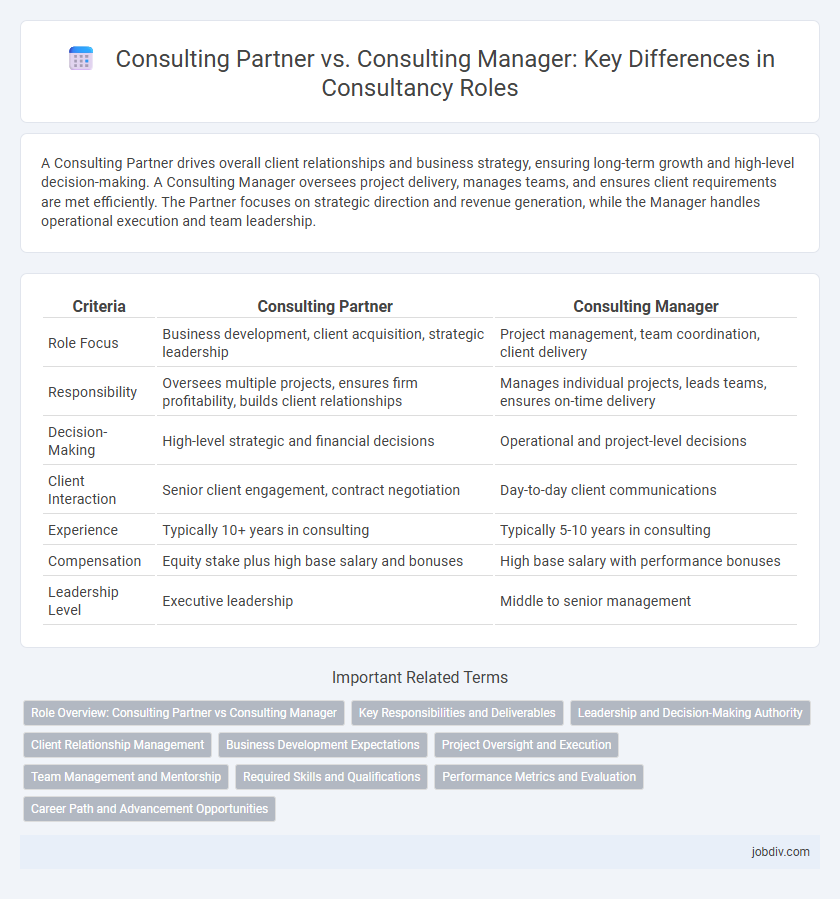A Consulting Partner drives overall client relationships and business strategy, ensuring long-term growth and high-level decision-making. A Consulting Manager oversees project delivery, manages teams, and ensures client requirements are met efficiently. The Partner focuses on strategic direction and revenue generation, while the Manager handles operational execution and team leadership.
Table of Comparison
| Criteria | Consulting Partner | Consulting Manager |
|---|---|---|
| Role Focus | Business development, client acquisition, strategic leadership | Project management, team coordination, client delivery |
| Responsibility | Oversees multiple projects, ensures firm profitability, builds client relationships | Manages individual projects, leads teams, ensures on-time delivery |
| Decision-Making | High-level strategic and financial decisions | Operational and project-level decisions |
| Client Interaction | Senior client engagement, contract negotiation | Day-to-day client communications |
| Experience | Typically 10+ years in consulting | Typically 5-10 years in consulting |
| Compensation | Equity stake plus high base salary and bonuses | High base salary with performance bonuses |
| Leadership Level | Executive leadership | Middle to senior management |
Role Overview: Consulting Partner vs Consulting Manager
Consulting Partners primarily focus on business development, client relationship management, and strategic decision-making to drive firm growth, while Consulting Managers oversee project delivery, manage teams, and ensure client satisfaction through effective execution. Partners hold accountability for long-term client engagement and revenue generation, whereas Managers concentrate on operational excellence and meeting project milestones. Both roles require strong leadership, but Partners emphasize market positioning and firm strategy, contrasting with Managers' focus on project management and team coordination.
Key Responsibilities and Deliverables
Consulting Partners primarily drive business development, client relationship management, and strategic oversight, ensuring alignment with client goals and delivering high-impact solutions. Consulting Managers focus on project execution, team leadership, and operational management, overseeing day-to-day activities and ensuring deliverables meet quality standards and timelines. Partners deliver long-term value through strategic vision and growth, while Managers provide tactical implementation and project success.
Leadership and Decision-Making Authority
Consulting Partners hold ultimate leadership responsibility and possess extensive decision-making authority, shaping strategic direction and client relationships. Consulting Managers lead project teams and make tactical decisions within established frameworks, ensuring execution aligns with client goals. The Partner's role emphasizes long-term vision and business growth, while the Manager focuses on operational leadership and day-to-day management.
Client Relationship Management
Consulting Partners typically oversee high-level client relationship management, focusing on strategic alignment, long-term partnerships, and securing new business opportunities. Consulting Managers manage day-to-day client interactions, ensuring project delivery meets client expectations and addressing immediate concerns. Effective client relationship management relies on Partners driving trust and growth while Managers maintain satisfaction through consistent communication and problem-solving.
Business Development Expectations
Consulting partners are primarily responsible for driving high-level business development, including securing major client accounts and forming strategic alliances that generate substantial revenue streams. Consulting managers focus on advancing business development by nurturing existing client relationships, identifying opportunities within current accounts, and supporting proposal development to expand project scope. Both roles aim to grow the firm's client base, but partners emphasize long-term market positioning while managers concentrate on operational execution and client retention.
Project Oversight and Execution
Consulting Partners primarily focus on strategic project oversight, ensuring alignment with long-term business goals and maintaining client relationships at an executive level. Consulting Managers concentrate on day-to-day project execution, managing teams, and delivering specific project milestones within scope, time, and budget constraints. Both roles are integral to successful consulting engagements, balancing high-level vision with operational detail.
Team Management and Mentorship
Consulting Partners primarily focus on strategic leadership, overseeing multiple project teams while nurturing client relationships and guiding senior managers. Consulting Managers concentrate on day-to-day team management, ensuring project deliverables meet standards while providing direct mentorship to consultants and analysts. Both roles are essential for talent development, but Partners emphasize high-level mentorship and organizational growth, whereas Managers focus on hands-on team support and skill-building.
Required Skills and Qualifications
Consulting Partners must possess exceptional leadership, strategic vision, and client relationship management skills, typically backed by extensive industry experience and advanced degrees such as MBAs. Consulting Managers require strong project management abilities, analytical problem-solving expertise, and proficiency in team coordination, often supported by relevant certifications and several years of consulting experience. Both roles demand excellent communication skills, but Partners focus more on business development while Managers emphasize delivering project outcomes.
Performance Metrics and Evaluation
Consulting Partners are primarily evaluated on firm-wide performance metrics such as revenue growth, client acquisition, and strategic account management, reflecting their role in driving business expansion and fostering long-term client relationships. Consulting Managers focus on project-specific performance indicators including successful project delivery, client satisfaction scores, team productivity, and adherence to budgets and timelines. Performance evaluations for Partners emphasize leadership impact and profitability, whereas Managers are assessed on operational effectiveness and team management within individual engagements.
Career Path and Advancement Opportunities
Consulting Partners typically hold senior leadership roles responsible for client acquisition, strategic decision-making, and overall firm profitability, offering expansive career advancement through equity stakes and executive influence. Consulting Managers focus on project execution, team leadership, and operational management, serving as a crucial step in the career path toward senior roles like Partner by demonstrating client engagement and delivery excellence. Advancement opportunities from Manager to Partner demand strong business development skills, industry expertise, and a proven track record of driving firm growth.
Consulting Partner vs Consulting Manager Infographic

 jobdiv.com
jobdiv.com